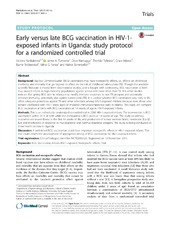| dc.contributor.author | Nankabirwa, Victoria | en_US |
| dc.contributor.author | Tumwine, James K | en_US |
| dc.contributor.author | Namugga, Olive | en_US |
| dc.contributor.author | Tylleskär, Thorkild | en_US |
| dc.contributor.author | Ndeezi, Grace | en_US |
| dc.contributor.author | Robberstad, Bjarne | en_US |
| dc.contributor.author | Netea, Mihai G. | en_US |
| dc.contributor.author | Sommerfelt, Halvor | en_US |
| dc.date.accessioned | 2018-09-05T12:08:37Z | |
| dc.date.available | 2018-09-05T12:08:37Z | |
| dc.date.issued | 2017-03-31 | |
| dc.Published | Nankabirwa V, Tumwine JK, Namugga, Tylleskär T, Ndeezi G, Robberstad B, Netea MG, Sommerfelt H. Early versus late BCG vaccination in HIV-1-exposed infants in Uganda: Study protocol for a randomized controlled trial. Trials. 2017;18:152 | eng |
| dc.identifier.issn | 1745-6215 | |
| dc.identifier.uri | https://hdl.handle.net/1956/18406 | |
| dc.description.abstract | Background: Bacillus Calmette-Guérin (BCG) vaccination may have nonspecific effects, i.e., effects on childhood morbidity and mortality that go beyond its effect on the risk of childhood tuberculosis (TB). Though the available scientific literature is mostly from observational studies, and is fraught with controversy, BCG vaccination at birth may protect infants in high-mortality populations against serious infections other than TB. Yet, other studies indicate that giving BCG later in infancy may modify immune responses to non-TB antigens and potentially enhance immunity, potentially also against tuberculosis (TB). It is unclear whether BCG vaccination very early in life offers adequate protection against TB and other infections among HIV-1-exposed children because even those who remain uninfected with HIV-1 show signs of impaired immunocompetence early in infancy. This study will compare BCG vaccination at birth with BCG vaccination at 14 weeks of age in HIV-1-exposed infants. Methods: This is an individually randomized controlled trial in 2200 HIV-1-exposed infants. The intervention is BCG vaccination within 24 h of birth while the comparator is BCG given at 14 weeks of age. The study co-primary outcomes are severe illness in the first 14 weeks of life, and production of tumor necrosis factor, interleukin (IL)-1β, IL-6 and interferon-γ in response to mycobacterial and nonmycobacterial antigens. The study is being conducted in three health centers in Uganda. Discussion: A well-timed BCG vaccination could have important nonspecific effects in HIV-1-exposed infants. This trial could inform the development of appropriate timing of BCG vaccination for HIV-1-exposed infants. | en_US |
| dc.language.iso | eng | eng |
| dc.publisher | BioMed Central | eng |
| dc.rights | Attribution CC BY | eng |
| dc.rights.uri | http://creativecommons.org/licenses/by/4.0 | eng |
| dc.subject | BCG | eng |
| dc.subject | Vaccination | eng |
| dc.subject | Infants HIV-1-exposed | eng |
| dc.subject | Nonspecific effects | eng |
| dc.subject | Trial | eng |
| dc.title | Early versus late BCG vaccination in HIV-1-exposed infants in Uganda: Study protocol for a randomized controlled trial | en_US |
| dc.type | Peer reviewed | |
| dc.type | Journal article | |
| dc.date.updated | 2018-03-05T14:25:54Z | |
| dc.description.version | publishedVersion | en_US |
| dc.rights.holder | Copyright 2017 The Author(s) | |
| dc.identifier.doi | https://doi.org/10.1186/s13063-017-1881-z | |
| dc.identifier.cristin | 1487597 | |
| dc.source.journal | Trials | |
| dc.relation.project | Norges forskningsråd: 223269 | |

